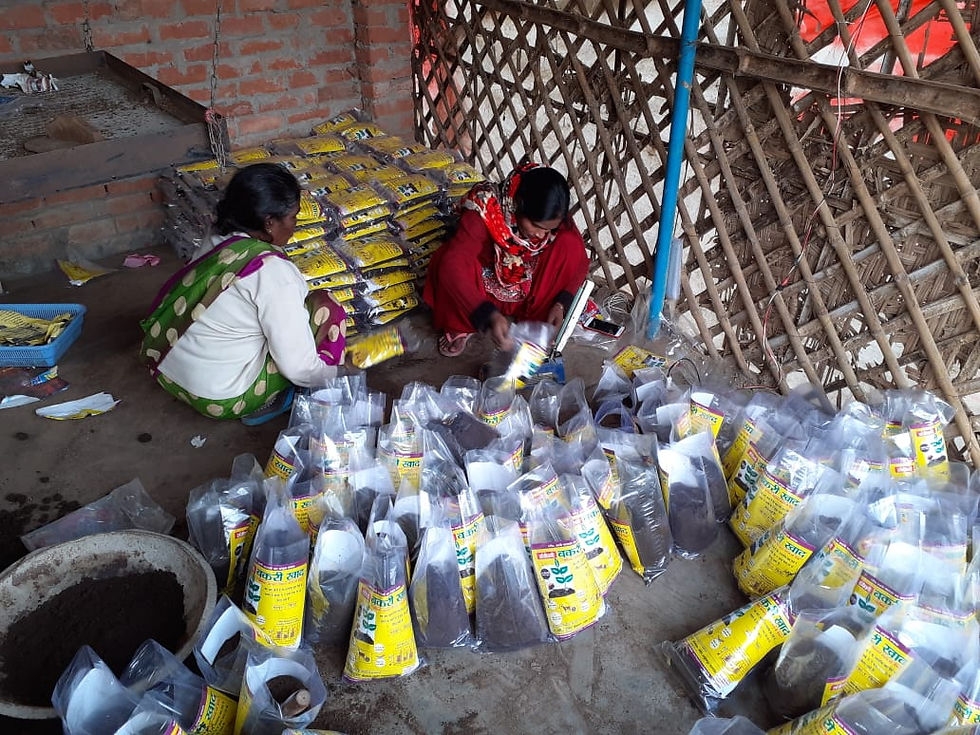Goat Dung: A Valuable Resource for Manure
- Global Services TGT
- Aug 28, 2024
- 3 min read

The Goat farming not only provides milk, meat, and other valuable products, but also generates a valuable by-product like goat dung/ dropping. This organic material can be a significant asset and can play an imperative role in sustainable agriculture, particularly for small-scale farmers. Goat dung, when properly managed and utilized, serves as an excellent organic manure, enriching soil fertility and improving crop yields.
Nutrient Composition of Goat Dung
Rich in Essential Nutrients: Goat dung is packed with essential nutrients required for plant growth, including nitrogen, phosphorus, potassium, and other trace elements like calcium and magnesium. These nutrients are released slowly, ensuring a sustained supply to crops over time, which is beneficial for long-term soil health. On an average, the goat dung manure contains 3% N, 1% P2O5 and 2% K2O.
Balanced pH Levels: Goat dung tends to have a near-neutral pH (The Goat fresh manure showed pH of 8.9 and 7.8 in compost manure), making it suitable for a wide range of crops. Unlike some other types of manure, it does not significantly alter the soil's pH, reducing the risk of acidity or alkalinity issues that can harm plant growth.
Benefits of Goat Dung as Manure
Improves Soil Structure: Goat dung enhances soil structure by increasing its organic matter content. This results in better soil aeration, water retention, and drainage, which are crucial for healthy root development. Well-structured soil is less prone to erosion and compaction, making it more resilient in various weather conditions.
Enhances Soil Fertility: The slow release of nutrients from goat dung helps maintain soil fertility over an extended period. This makes it an ideal manure for crops that require a steady supply of nutrients, such as vegetables, grains, and fruit trees. Improved fertility leads to higher crop yields, which can significantly benefit small-scale farmers.
Promotes Microbial Activity: Goat dung supports the growth of beneficial soil microorganisms that play a crucial role in nutrient cycling and organic matter decomposition. These microbes help convert the nutrients in the dung into forms that plants can easily absorb, further enhancing soil fertility.
Environmentally Friendly: Using goat dung as manure is an eco-friendly practice that reduces the reliance on chemical fertilizers, which can lead to soil degradation, food hazards and ground water pollution with environmental hazard leads to it’s effect on animals and humans. By recycling organic waste, farmers can maintain sustainable agricultural practices and reduce their environmental footprint.
Water Holding Capacity: Goats manure is famous for increasing the water holding capacity of the soil, among other uses and excellent water retention in soil. It is estimated that a single can provide goat’s manure plus its wasted food and hay exceed to 1000 kg per year.
Applications in Farming & Horticulture
Direct Application: Fresh or composted goat dung can be applied directly to fields as a top dressing or mixed into the soil before planting. It is particularly effective in gardens, orchards, and crop fields.
Composting: Goat dung can be composted with other organic materials such as Neem Leaves, Bird Droppings (Beat), Kitchen Waste etc.. Composting enhances the manure's nutrient content and makes it safer to use by reducing the risk of pathogens. The composted material can then be used to enrich garden beds, fields, and potted plants.
Vermiculture: Goat dung can also be used in vermiculture (worm farming) to produce vermicompost, a highly nutrient-rich fertilizer. The dung serves as a food source for worms, which break it down into a fine, crumbly substance that is ideal for boosting soil fertility.
Goat dung is a valuable by-product of goat farming, offering numerous benefits as organic manure. Its rich nutrient content, ability to improve soil structure, and environmental sustainability make it an essential resource for small-scale farmers and gardeners. By effectively utilizing goat dung, farmers can enhance crop yields, improve soil health, and contribute to sustainable agricultural practices.



Comments